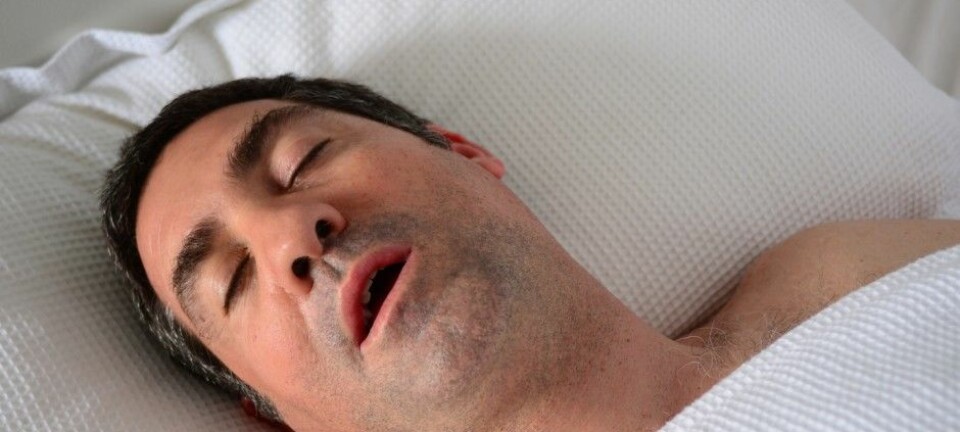
Testing new approaches to insomnia
Relatively few people who struggle with insomnia get psychological help. An interactive online program under development may offer widespread help to those with sleep problems.
Many of us have experienced sleepless nights, when the body is tired but the brain won’t shut down. Perhaps the cause is stress from a big project at the office, or worries about an upcoming exam — or maybe the cause is something purely physical, like the hot flashes from menopause.
Aside from crunching the occasional sleeping pill, however, most insomniacs are on their own, because it can be difficult or expensive to get psychological help.
Now, a researcher at the Norwegian University of Science and Technology (NTNU) is testing an interactive online program for insomnia that offers the potential of being available for anyone who needs it.
Havard Kallestad is a postdoctoral researcher who is studying chronic insomnia. Earlier this month, he gave a lecture at the Norwegian National Research Conference on Mental Health and Drug Abuse in Oslo about the possible treatment for people with sleep problems using his online program.
As good as talking to a therapist
Kallestad says he and his colleagues have had very encouraging results when people with sleep problems use the online program.
A study that is in press reports that the effect of the program is similar to talking to a psychologist or a sleep specialist.
“We also have a study where we have conducted additional tests and comparing online treatment with treatment from a sleep specialist,” he said.
The study, in which people were randomly assigned to either treatment using the online program or being treated at a sleep clinic at St. Olavs Hospital, has now been completed.
Kallestad and his colleagues Børge Sivertsen and Øystein Veda, from the Norwegian Institute of Public Health and the University of Bergen, are now expanding their study to include as many as 1500 people.
Cognitive treatment better than sleeping pills
Research has shown that over the long term, cognitive psychological treatment is far more effective than medication for insomnia.
The only problem is that this treatment is not available to everyone.
“It can be difficult for people to get an appointment for good psychological treatment, and many people live far away from where they could be treated,” Kallestad said. “The nice thing about this online program is that it can be offered to everyone who is struggling with insomnia.”
“If it proves to be as effective as we think, I hope that our research can allow more people to be offered help,” he said.
The goal of the researchers is to make the program widely available.
Insomnia widespread
Researchers in Bergen have shown that between 10 and 15 per cent of the adult Norwegian population meets the criteria for a diagnosis of chronic insomnia, making it one of the largest health problems in the nation.
And the problem does not just affect older people. Younger people struggle to get enough sleep, too.
Figures from the Norwegian Prescription Database show that over the last ten years, the number of sleeping aids prescribed for use in children and adolescents between the ages of zero to 19 years has doubled.
Over a quarter of all young people between 18 and 30 years old struggle with sleep problems, according to one recent study.
Sleeplessness affects daily life
Børge Sivertsen, a sleep researcher at the Norwegian Institute of Public Health, has shown that tiredness and the health problems related to insomnia can increase the risk of dropping out of the labour market.
Sleep problems are also very common in a range of mental disorders, according to findings from Kallestad’s 2012 doctoral dissertation.
Nevertheless, insomnia is rarely treated separately from mental illness. Some researchers wonder whether sleep problems may actually lead to mental illness rather than the other way around.
Chronic insomniacs are very similar
Stress is a common cause of insomnia, but not the only cause, Kallestad says.
“There are many different ways that people can develop sleep problems,” he said. “But when the problem becomes chronic, people are more and more alike.”
One commonality for people with chronic sleep problems is that they spend too much time in bed, Kallestad said.
“They lie there and twist and turn, trying to get to sleep. Their bed eventually becomes associated with sleeplessness. And people become more and more anxious about not getting a good night’s sleep,” he said.
Go to bed without dread
Cognitive therapy treatment for insomnia involves changing people’s habits. This is exactly what the researchers’ web-based application is designed to do.
“The treatment lasts 6-8 weeks. Instead of getting an appointment with a psychologist every week, you get a new module with different themes. The modules make suggestions about how you should think about sleep, what you should eat or drink, what you should do or not do before going to bed,” Kallestad said.
It’s not easy to help people change habits, he says, but he hopes that the program can make a difference for patients who dread going to bed at night.
-------------------------------------
Read the Norwegian version of this article at forskning.no








